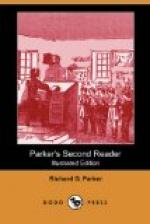19. But if you will recollect that c is sounded like k when it stands before the letters a, o, or u, and that it is sounded like s before the letters e, i, and y, you will have very little trouble in reading words that have the letter c in them.
20. So also the letter g has two sounds, called the hard sound, and the soft sound. The hard sound is the sound given to it in the word gone; the soft sound is that which is heard in the word gentle.
21. The same rule which you have just learnt with regard to the letter c applies to the letter g. It has its hard sound before a, o, and u, and its soft sound before e, i, and y.
22. There are, it is true, some words where this rule is not applied; but these words are very few, so that you may safely follow this rule in most words.
23. The letters ph are sounded like f. The letters ch are sounded sometimes like k, as in the words loch and monarch, and sometimes like sh, as in the words chaise and charade; and they have sometimes a sound which cannot be represented by any other letters, as in the words charm and chance.
24. I suppose that you have probably learned most of these things which I have now told you in your spelling-book; but I have repeated them in this book, because I have so often found that little boys and girls are very apt to forget what they have learned.
25. If you recollect them all, it will do you no harm to read them again, but it will impress them more deeply on your memory. But if you have forgotten them, this little book will recall them to your mind, so that you will never forget them.
26. I recollect, when I was a little boy, that the letter y used to trouble me very much when it began a word, and was not followed by one of the letters which are called vowels, namely, a, e, i, o, u. I knew how to pronounce ya, ye, yi, yo, yu; but one day, when I was studying a lesson in geography, I saw a word which was spelt Y, p, r, e, s, which puzzled me very much.
27. I knew that the letters p, r, e, s, would spell pres, but I did not know what to call the y. After studying it a long time, I found that the letter y, in that word and some others, was to be pronounced like the long e, and that the word was pronounced Epres, though it was spelled Y, p, r, e, s.
28. Perhaps you will be able, when you grow up, to write a book; and to tell little boys and girls who go to school, when you have grown up, how to read hard words, better than I have told you.
29. If you wish to do so, you must try to recollect what puzzles you most now, and then you will be able to inform them how to get over their difficulties and troubles at school; and when they grow up, I have no doubt that they will feel very grateful to you for the assistance you have given them.




